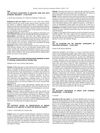 February 2024 in “International Journal of Health and Pharmaceutical”
February 2024 in “International Journal of Health and Pharmaceutical” Black rice extract ointment significantly promotes hair growth in Wistar rats.
[object Object]  February 2024 in “International Journal of Progressive Research in Engineering Management and Science”
February 2024 in “International Journal of Progressive Research in Engineering Management and Science” The herbal shampoo is safe, effective, and helps treat hair loss.
 December 2023 in “Research in pharmacy”
December 2023 in “Research in pharmacy” Phytotherapeutic compounds and supplements can help manage Polycystic Ovarian Syndrome (PCOS).
 December 2023 in “Migration letters”
December 2023 in “Migration letters” Herbal treatments can help manage PCOS symptoms.
 December 2023 in “World Journal Of Advanced Research and Reviews”
December 2023 in “World Journal Of Advanced Research and Reviews” A natural hair mask was made to improve hair growth and prevent hair loss safely.
 August 2023 in “International journal of basic and clinical pharmacology”
August 2023 in “International journal of basic and clinical pharmacology” Herbal hair serum promotes natural hair growth and maintains healthy hair.
 June 2023 in “Journal of Ayurvedic and herbal medicine”
June 2023 in “Journal of Ayurvedic and herbal medicine” Pumpkin seeds may improve health due to their rich nutrients and potential to treat various conditions.
 March 2023 in “Journal of pharmacognosy and phytochemistry”
March 2023 in “Journal of pharmacognosy and phytochemistry” Unripe fruits of three banana species have many health-boosting compounds useful for medicine.
 August 2021 in “Journal of Fundamental and Applied Pharmaceutical Science”
August 2021 in “Journal of Fundamental and Applied Pharmaceutical Science” Black tea extract at 5% concentration promotes the most hair growth.
[object Object]  October 2020 in “Journal of bio innovation”
October 2020 in “Journal of bio innovation” DanEraTM hair tonic effectively treats dandruff and hair fall using natural ingredients.
 January 2020 in “Der Pharmacia Lettre”
January 2020 in “Der Pharmacia Lettre” Nanoparticle-based herbal remedies could be promising for treating hair loss with fewer side effects and lower cost, but more research is needed.
 April 2018 in “Journal of Ayurveda and integrative medicine”
April 2018 in “Journal of Ayurveda and integrative medicine” Ayurvedic treatment improved hair growth in a person with hair loss.
 September 2014 in “Journal der Deutschen Dermatologischen Gesellschaft”
September 2014 in “Journal der Deutschen Dermatologischen Gesellschaft” Diabetes can cause a variety of skin disorders, some of which may signal more serious health issues.
 January 2011 in “Springer eBooks”
January 2011 in “Springer eBooks” Eating a balanced diet with the right vitamins and minerals is important for healthy hair, but too many supplements can be harmful.
 June 2008 in “Dermatologic Surgery”
June 2008 in “Dermatologic Surgery” Hydrogen peroxide may have both positive and negative effects on wound healing, and its safe concentration for hair transplant surgery is unclear.
 January 2021 in “Journal of cosmetology & trichology”
January 2021 in “Journal of cosmetology & trichology” The treatment improved hair growth and thickness in patients with hair loss, even 10 months after therapy without additional products.
 467 citations,
October 2014 in “European Journal of Endocrinology”
467 citations,
October 2014 in “European Journal of Endocrinology” The European Society of Endocrinology advises individualized long-term management for PCOS, focusing on lifestyle changes, accurate diagnosis, and treatments for associated health risks and symptoms.
 320 citations,
December 2018 in “Frontiers in Immunology”
320 citations,
December 2018 in “Frontiers in Immunology” Changing how mesenchymal stromal cells are grown can improve their healing abilities.
 281 citations,
January 2013 in “British Journal of Dermatology”
281 citations,
January 2013 in “British Journal of Dermatology” Manage vitiligo with treatments, address emotions, and use camouflage techniques.
 253 citations,
April 2014 in “Drugs”
253 citations,
April 2014 in “Drugs” Teriflunomide helps reduce multiple sclerosis symptoms and is safe for most patients.
 244 citations,
September 2008 in “Annual Review of Genomics and Human Genetics”
244 citations,
September 2008 in “Annual Review of Genomics and Human Genetics” The document concludes that the fast-growing direct-to-consumer genetic testing market lacks sufficient regulation, posing risks to consumers due to questionable test quality and accuracy.
 211 citations,
February 2009 in “European journal of pharmaceutics and biopharmaceutics”
211 citations,
February 2009 in “European journal of pharmaceutics and biopharmaceutics” Hair follicles help absorb and store topical compounds, aiding targeted drug delivery.
 195 citations,
January 2008 in “Photochemistry and Photobiology”
195 citations,
January 2008 in “Photochemistry and Photobiology” Visible light can damage skin and most sunscreens don't block it well; more research is needed on its effects and protection methods.
 170 citations,
September 2019 in “Evidence-based Complementary and Alternative Medicine”
170 citations,
September 2019 in “Evidence-based Complementary and Alternative Medicine” Some medicinal plants can help heal wounds and may lead to new treatments.
 148 citations,
December 2018 in “Journal of autoimmunity”
148 citations,
December 2018 in “Journal of autoimmunity” Alopecia areata is an autoimmune disease causing patchy hair loss, often with other autoimmune disorders, but its exact causes are unknown.
 134 citations,
December 2018 in “Dermatology and Therapy”
134 citations,
December 2018 in “Dermatology and Therapy” Some vitamins and minerals like vitamin D and iron can help with certain types of hair loss, but more research is needed for others.
 127 citations,
June 2008 in “British Journal of Clinical Pharmacology”
127 citations,
June 2008 in “British Journal of Clinical Pharmacology” Low doses of some substances can be beneficial, while high doses can be harmful or toxic.
 125 citations,
May 2019 in “Phytomedicine”
125 citations,
May 2019 in “Phytomedicine” Cepharanthine is a well-tolerated drug with multiple medical uses, including anti-inflammatory and anti-cancer properties.
 116 citations,
December 2017 in “International Journal of Women's Dermatology”
116 citations,
December 2017 in “International Journal of Women's Dermatology” Adult female acne treatment should be personalized, considering individual preferences and pregnancy, using various topical and oral medications while managing side effects and resistance.
 99 citations,
June 2005 in “Journal of Cosmetic Dermatology”
99 citations,
June 2005 in “Journal of Cosmetic Dermatology” Hair ages due to genetics and environmental factors, leading to graying and thinning, with treatments available for some conditions.






























